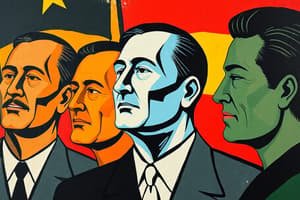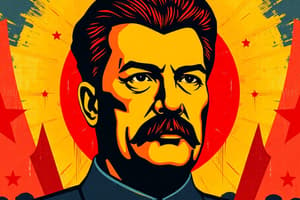Podcast
Questions and Answers
What economic condition in Germany contributed significantly to the rise of Hitler?
What economic condition in Germany contributed significantly to the rise of Hitler?
- Post-war industrial boom
- Increased foreign investments
- Strong agricultural growth
- Economic depression and hyperinflation (correct)
Which strategy did Mussolini employ to gain support for his regime?
Which strategy did Mussolini employ to gain support for his regime?
- Promoting democratic reforms
- Restoration of Roman greatness (correct)
- Advocating for socialist policies
- Establishing international coalitions
What response did the League of Nations have to Japan's invasion of Manchuria?
What response did the League of Nations have to Japan's invasion of Manchuria?
- Strong military intervention
- Immediate economic sanctions
- Reinforcement of member nations' military presence
- Weak sanctions and eventual inaction (correct)
How did Francisco Franco establish his power in Spain?
How did Francisco Franco establish his power in Spain?
What approach did the United States take initially toward the growing threats in Europe and Asia?
What approach did the United States take initially toward the growing threats in Europe and Asia?
What event significantly shifted American public opinion toward involvement in World War II?
What event significantly shifted American public opinion toward involvement in World War II?
Which characteristic defined Stalin's rise to power in Russia?
Which characteristic defined Stalin's rise to power in Russia?
What was a result of the Treaty of Versailles for Germany?
What was a result of the Treaty of Versailles for Germany?
What motivated Japan's aggressive territorial expansion during the pre-WWII period?
What motivated Japan's aggressive territorial expansion during the pre-WWII period?
How did the experience of WWI affect American sentiment towards foreign conflicts in the 1930s?
How did the experience of WWI affect American sentiment towards foreign conflicts in the 1930s?
Flashcards
Post-WWI Germany's Conditions
Post-WWI Germany's Conditions
The Treaty of Versailles imposed harsh reparations, territorial losses, and military restrictions on Germany after WWI, creating deep resentment and instability. This, combined with the economic depression and hyperinflation, led to a desperate societal situation that propelled extremist ideologies like Nazism.
Hitler's Rise to Power
Hitler's Rise to Power
Hitler exploited Germany's anger towards the Treaty of Versailles, economic hardship, and fear of communism. He offered promises of economic recovery, restoring Germany's greatness, and restoring national pride. He consolidated power through propaganda and the Enabling Act, effectively ending democracy.
Appeasement
Appeasement
The Munich Agreement allowed Germany to annex the Sudetenland, a region in Czechoslovakia with a predominantly German population. It epitomized a policy of appeasement, where powerful countries gave in to Hitler's demands to avoid war.
Post-WWI Italy's Conditions
Post-WWI Italy's Conditions
Signup and view all the flashcards
Mussolini's Rise to Power
Mussolini's Rise to Power
Signup and view all the flashcards
Japan's Expansionist Policies
Japan's Expansionist Policies
Signup and view all the flashcards
The Spanish Civil War
The Spanish Civil War
Signup and view all the flashcards
Stalin's Totalitarian Control
Stalin's Totalitarian Control
Signup and view all the flashcards
American Isolationism and Shift to War
American Isolationism and Shift to War
Signup and view all the flashcards
The League of Nations' Failure
The League of Nations' Failure
Signup and view all the flashcards
Study Notes
Conditions Following WWI
- Treaty of Versailles imposed harsh reparations, territorial losses, and military restrictions on Germany.
- Economic depression and hyperinflation destabilized German society.
- Political instability in the Weimar Republic, created fertile ground for extremism.
Strategy/Rise of Leader
- Germany exploited resentment of the Treaty of Versailles and fear of communism to gain support.
- Hitler consolidated power through the Enabling Act and propaganda.
- Italy's Mussolini promised to restore Roman greatness.
- Mussolini used propaganda, Blackshirts, and violence to suppress opposition.
- Japan's Hirohito aligned with Hitler, and pushed for expansion to secure resources.
- Hirohito leveraged military power for imperial expansion.
- Franco used military force and alliances in Spain's civil war to consolidate power, established a dictatorship.
- Stalin rose through the Communist Party and purges. This controlled the Soviet Union through NKVD.
- Stalin promoted one-country socialism and expansive Soviet influence.
America/World's Reactions
- Initial appeasement by Western democracies (e.g. Munich Agreement).
- Limited action due to U.S. isolationist policies.
- League of Nations failed to check German aggression.
- Western democracies largely ignored Mussolini's early conquests, like Ethiopia.
- U.S. condemned Japan's invasion but did not directly intervene.
- League of Nations imposed weak sanctions, Japan left in 1933.
- Western democracies remained neutral during the Spanish Civil War.
- Roosevelt's U.S. maintained a policy of non-intervention in other conflicts.
Studying That Suits You
Use AI to generate personalized quizzes and flashcards to suit your learning preferences.





